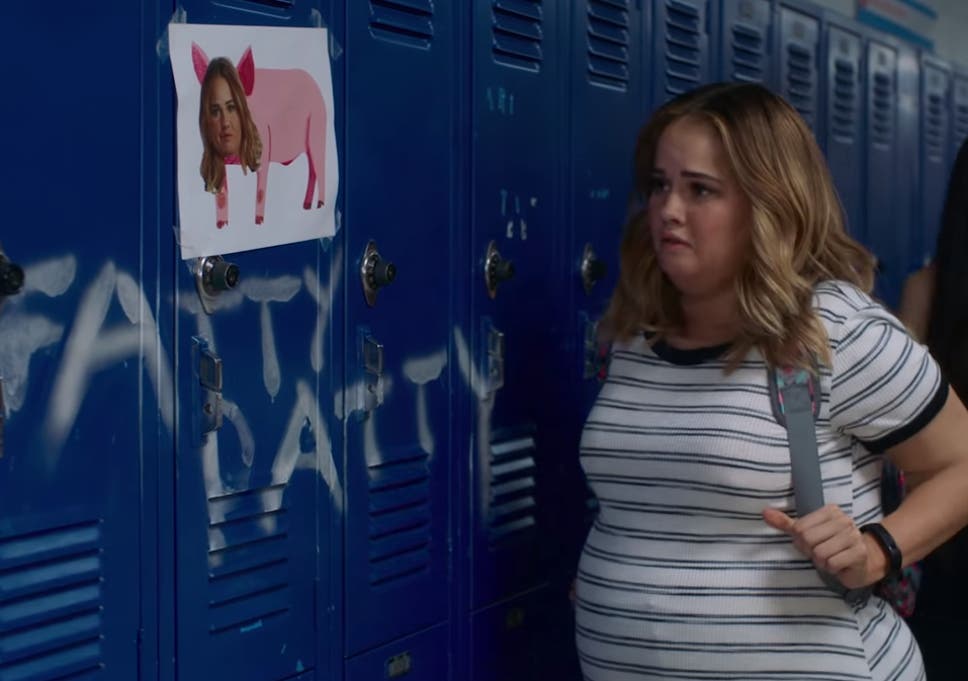
- Netflix executive Cindy Holland defended the upcoming original series, “Insatiable,” at the streamer’s Television Critics Association presentation.
- “The creator [Lauren Gussis] felt very strongly about exploring these issues based on her own experiences, but satirically, in a very over the top way,” Holland said.
- The show, in which a high school girl wires her mouth shut to lose weight, has been accused of “fat-shaming” and promoting eating disorders.
The first 30 seconds of the trailer for Insatiable, a new comedy series coming to Netflix on August 10, introduces the story of a chubby high schooler grappling with bullies, unrequited crushes, and the FOMO that comes from nights spent on the couch eating ice cream.

It’s all a fairly standard setup for what looks to be a show about modern teens — perhaps even one that, like Bo Burnham’s Eighth Grade, is benefited by the fact that its lead looks more like an average high schooler than the glamorous 20-something stars of shows like Riverdale.
But then the trailer takes a turn. Patty, our main character, gets punched in the face, has her jaw wired shut for months, and thereby loses so much weight that by the time she goes back to school in the fall, she’s a bona fide (thin) hottie. It’s with this newfound power that she can apparently get her revenge on the kids who’d excluded her in the past.

Netflix defended its controversial upcoming original series, which has been accused of “fat-shaming” in the lead-up to its release.
At the streamer’s Television Critics Association presentation, Netflix’s original series VP Cindy Holland addressed the controversy, but stood behind the show.
“The creator [Lauren Gussis] felt very strongly about exploring these issues based on her own experiences, but satirically, in a very over the top way,” Holland said, according to Deadline. “Ultimately, the message of the show is that what is most important is you feel most comfortable.”
She said the issue of “fat shaming is in the DNA of the show.” However, Holland also said that it was a topic that Netflix’s PR team could address better.

In the show, which is set to premiere on the streaming service August 10, a high-school girl named Patty gets her mouth wired shut so that she can lose weight, and then gets revenge on the people who made fun of her. Many have criticized the show based on its trailer, calling the show “insulting” and even “harmful,” and accusing it of promoting eating disorders.
An online petition for Netflix to not release the show has over 200,000 signatures as of Monday afternoon.
The petition states: “The toxicity of this series, is bigger than just this one particular series. This is not an isolated case, but part of a much larger problem that I can promise you every single woman has faced in her life, sitting somewhere on the scale of valuing their worth on their bodies, to be desirable objects for the male gaze. That is exactly what this series does. It perpetuates not only the toxicity of diet culture, but the objectification of women’s bodies.”
Watch the full “Insatiable” trailer below:
Because no one has officially reviewed the show yet, the trailer is all that we have to determine what the rest of Insatiable will look like and what themes it will deal with. But based on that minute and 30 seconds, the reaction has been … not great.
Critics on Twitter and elsewhere have called the premise of the show fatphobic, triggering to people with eating disorders, and a regressive lens through which to view fat people’s stories. The Good Place star Jameela Jamil, who has advocated for body autonomy in the past, tweeted about how there’s a problem with implying that the only way to “win” in life is to diet:
Not very into the premise of Fatty Patty… a teenager stops eating and loses weight and then when “conventionally attractive” takes revenge on her schoolmates? This is still telling kids to lose weight to “win.” The fat shaming is inherent and pretty upsetting.
— Jameela Jamil 🌈 (@jameelajamil) July 20, 2018
tar Debby Ryan, a former Disney Channel actress, defended the show on Instagram, writing that it was a satirical look at “how difficult and scary it can be to go to move through the world in a body,” and assured viewers that the humor is “not in the fat-shaming.” Alyssa Milano, who also appears in the trailer, said in a 30-minute Twitter video that she “totally gets” the backlash to the trailer but hopes people will wait to see the full show before judging it.
This, above all, is what the creators and stars are attempting to communicate. But for people who are so accustomed to seeing their stories told onscreen via the same harmful tropes, the Insatiable trailer could be seen as just another exhausting example of the negative ways TV and movies portray fat people.
Popular media has a long way to go in confronting its own fatphobia. To understand why the Insatiable trailer hit such a nerve, you have to look at pop culture’s terrible track record of telling fat people’s stories.